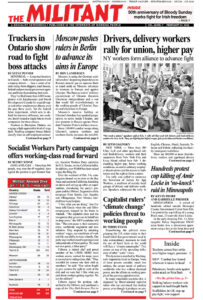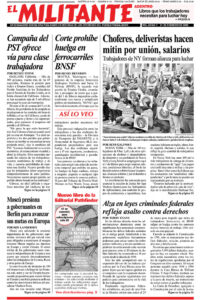As President Vladimir Putin demands Ukraine submit to Russian domination, Ukrainian workers and farmers are mobilizing to defend their independence. Putin rails against V.I. Lenin and the 1917 Bolshevik Revolution he led for its support to self-determination for those fighting to break free from the tyranny they suffered under the czarist “prison house of nations.”
This makes it crucial to study the continuity of communism on this question.
The best place to start is the Pathfinder book, Lenin’s Final Fight: Speeches and Writings, 1922-23. Here Lenin discusses the rights of oppressed nationalities and the need to combat Great Russian chauvinism. It is the record of his battle to defend the Bolsheviks’ policies on the rights of oppressed nations against an intensifying attack from Joseph Stalin and the growing bureaucratic caste he spoke for.
Putin insists Stalin was right against Lenin.
Prior to the 1917 revolution, under czarist rule, Ukrainians, Jews, Tatars, and millions in Central Asia and the Caucasus region were oppressed, denied the basic right to read or use their native language, practice their religion or exercise control over cultural, economic and political affairs.
With the victory of the Bolshevik Revolution, the new workers and peasants government championed the right to self-determination of oppressed nationalities, within what had been the Russian Empire, and worldwide. The Ukrainian people established an autonomous republic and voluntarily joined the new Union of Soviet Socialist Republics. National pride grew. Use of the Ukrainian language, literature and the arts flourished.
In a 1922 memo to the Communist Party’s Political Bureau, Lenin declared “war to the death on dominant nation chauvinism.”
“Internationalism on the part of oppressors or ‘great’ nations,” he wrote to a party congress that same year, “must consist not only in the observance of the formal equality of nations but even as an inequality, through which the oppressor nation, the great nation, would compensate for the inequality which obtains in real life. Anybody who does not understand this has not grasped the real proletarian attitude to the national question.”
After Lenin’s death, Stalin led a thoroughgoing political counterrevolution against the policies that marked the Bolshevik Revolution and the first four congresses of the Communist International. He instigated the reimposition of Great Russian chauvinism over Ukraine and the other oppressed nations within the Soviet Union, which continued through its collapse in 1991 and has been the approach of the capitalist regime that grew up in Russia, and of the Putin government today.
The Stalinist regime took special vengeance against the workers and farmers of Ukraine. They arrested and had put to death thousands of Ukrainian writers, artists, intellectuals and political officials who had been put in place in Lenin’s time.
Under what is known there as the Holodomor, which literally means killing by hunger, the forced collectivization and onerous grain confiscation by Moscow led some 3.9 million workers and peasants to die of starvation in 1932 and 1933.
Exiled by Stalin, Bolshevik leader Leon Trotsky, who dedicated his life to defending Lenin’s political course, wrote in 1939 from Mexico: “Have Stalin and his Ukrainian satraps succeeded in convincing the Ukrainian masses of the superiority of Moscow’s centralism over Ukrainian independence or have they failed?
“The very genesis of the totalitarian regime and its ever more brutal intensification, especially in the Ukraine, are proof that the real will of the Ukrainian masses is irreconcilably hostile to the Soviet bureaucracy. There is no lack of evidence that one of the primary sources of this hostility is the suppression of Ukrainian independence.”
Standing on this revolutionary continuity, the Socialist Workers Party hailed the mass popular 2014 anti-Moscow uprising in Ukraine known as the Maidan. The Militant organized a series of reporting trips to Ukraine in 2014 and 2015 — from Sokol in the west to Chernobyl, the iron and coal mining regions of Kryvyi Rih and Pavlograd in the east, Kharkiv and elsewhere — to get out the truth about the working-class battles taking place and widespread support for Ukrainian sovereignty.

